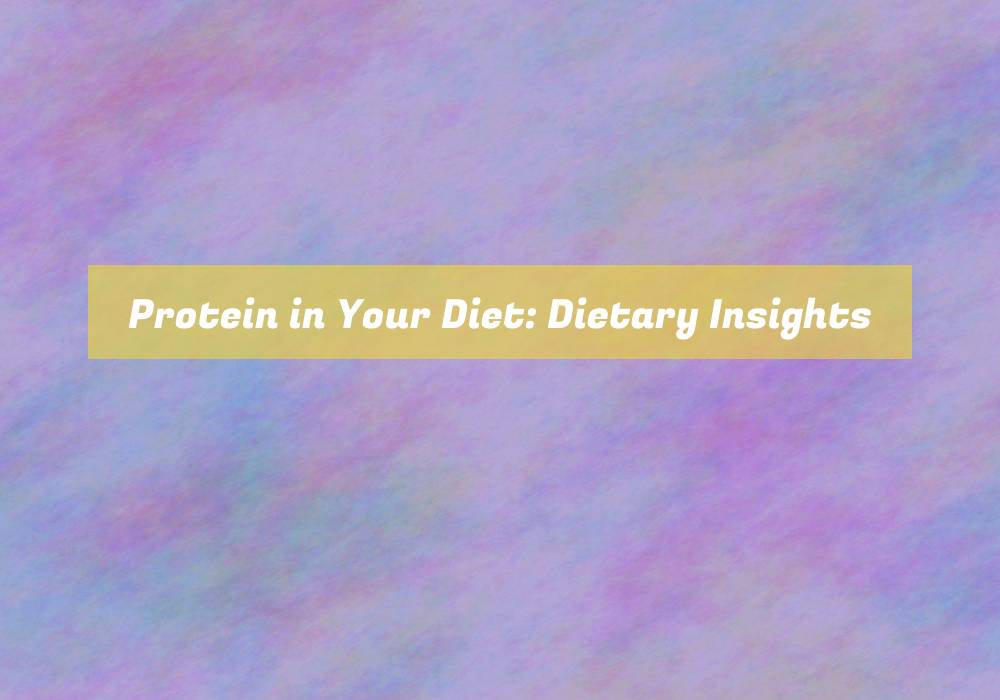Protein in Your Diet: Dietary Insights
You might not realize that protein is not just important for building muscle, but it also plays a crucial role in various bodily functions, including maintaining healthy skin, hair, and nails. The sources of protein go beyond just meat and seafood, and understanding the different options available can help you improve your overall diet.
By making a few simple changes, you can ensure that youG??re meeting your daily protein requirements without feeling overwhelmed by the thought of altering your entire diet. But how can you be sure youG??re getting enough protein and incorporating it into your meals effectively?
Importance of Protein in Your Diet
Ensuring an adequate intake of protein is essential for maintaining muscle mass and supporting overall health. Protein is crucial for repairing and building tissues, making enzymes and hormones, and maintaining healthy skin and hair.
When you consume protein, your body breaks it down into amino acids, which are the building blocks of muscle and essential for various bodily functions. Without enough protein, your muscles may weaken, and you may experience fatigue, a weakened immune system, and slow recovery from injuries.
Incorporating protein into your diet can also aid in weight management. Protein helps you feel full and satisfied, reducing the likelihood of overeating. Additionally, it has a higher thermic effect compared to fats and carbohydrates, meaning your body burns more calories digesting protein than it does digesting other macronutrients.
Protein sources such as lean meats, poultry, fish, eggs, dairy products, legumes, and nuts can provide you with the necessary amino acids. By including these foods in your meals, you can ensure that your body receives the protein it needs to function optimally and support your overall health and well-being.
Protein-Rich Food Sources
Considering the importance of protein in maintaining muscle mass and overall health, itG??s essential to know which food sources are rich in this vital nutrient.
Lean meats such as chicken, turkey, and beef are excellent protein sources. They not only provide high-quality protein but also essential nutrients like iron and B vitamins.
Fish, especially salmon, tuna, and sardines, are also great options due to their omega-3 fatty acids, which offer additional health benefits.
For those following a vegetarian or vegan diet, legumes such as lentils, chickpeas, and black beans are fantastic protein-rich alternatives. TheyG??re also high in fiber, making them a wholesome choice.
Additionally, dairy products like Greek yogurt, cottage cheese, and milk are packed with protein and calcium, crucial for bone health.
Eggs, particularly egg whites, are another convenient and versatile protein source.
Incorporating these protein-rich foods into your diet can help ensure you meet your bodyG??s daily protein requirements, supporting muscle growth, repair, and overall well-being.
Daily Protein Requirements
To maintain optimal health and support your bodyG??s muscle growth and repair, itG??s crucial to understand your daily protein requirements.
The amount of protein you need can vary based on factors such as age, sex, weight, and activity level. As a general guideline, itG??s recommended that adults get at least 0.8 grams of protein per kilogram of body weight per day. However, if youG??re physically active or looking to build muscle, you may need closer to 1.2 to 2.0 grams of protein per kilogram of body weight.
For example, if you weigh 68 kilograms, youG??d aim to consume between 54 and 136 grams of protein each day.
ItG??s important to distribute your protein intake evenly throughout the day, as your body can only utilize a certain amount of protein at a time. By including a source of protein in each meal and snack, you can ensure that your body has a consistent supply of this essential nutrient for muscle maintenance and repair.
Remember to consult with a healthcare professional to determine the specific protein requirements that best support your individual health and fitness goals.
Tips for Incorporating Protein Into Meals
You can easily add protein to your meals by including foods such as:
- Lean meats
- Fish
- Eggs
- Dairy products
- Legumes
- Nuts
Start your day with a protein-packed breakfast by adding Greek yogurt or a scoop of protein powder to your smoothie.
For lunch, incorporate grilled chicken, turkey, or tofu into your salads and sandwiches.
Snack on a handful of almonds or edamame for a protein boost during the day.
When preparing dinner, opt for lean cuts of meat like sirloin or pork loin, and include a side of beans or lentils for added protein.
Additionally, try adding quinoa or farro to your meals as a source of plant-based protein.
Experiment with different protein sources to keep your meals interesting and varied.
Consider meal prepping with hard-boiled eggs, grilled chicken, or cooked quinoa to easily add protein to your meals throughout the week.
Conclusion
In conclusion, making sure to include protein in your diet is crucial for overall health and well-being. By incorporating protein-rich foods into your meals and snacks, you can meet your daily requirements and support muscle growth, tissue repair, and immune function.
Whether itG??s lean meats, eggs, dairy, or plant-based options, there are plenty of delicious and nutritious ways to boost your protein intake and fuel your body.
So, make sure to prioritize protein in your diet for optimal health.





